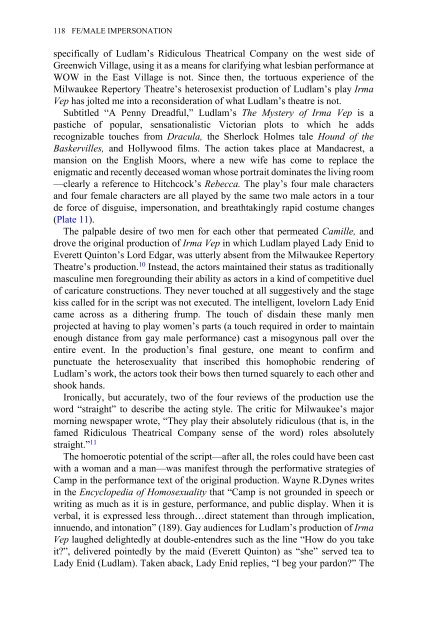Edited by Moe Meyer - Get a Free Blog
Edited by Moe Meyer - Get a Free Blog
Edited by Moe Meyer - Get a Free Blog
Create successful ePaper yourself
Turn your PDF publications into a flip-book with our unique Google optimized e-Paper software.
118 FE/MALE IMPERSONATION<br />
specifically of Ludlam’s Ridiculous Theatrical Company on the west side of<br />
Greenwich Village, using it as a means for clarifying what lesbian performance at<br />
WOW in the East Village is not. Since then, the tortuous experience of the<br />
Milwaukee Repertory Theatre’s heterosexist production of Ludlam’s play Irma<br />
Vep has jolted me into a reconsideration of what Ludlam’s theatre is not.<br />
Subtitled “A Penny Dreadful,” Ludlam’s The Mystery of Irma Vep is a<br />
pastiche of popular, sensationalistic Victorian plots to which he adds<br />
recognizable touches from Dracula, the Sherlock Holmes tale Hound of the<br />
Baskervilles, and Hollywood films. The action takes place at Mandacrest, a<br />
mansion on the English Moors, where a new wife has come to replace the<br />
enigmatic and recently deceased woman whose portrait dominates the living room<br />
—clearly a reference to Hitchcock’s Rebecca. The play’s four male characters<br />
and four female characters are all played <strong>by</strong> the same two male actors in a tour<br />
de force of disguise, impersonation, and breathtakingly rapid costume changes<br />
(Plate 11).<br />
The palpable desire of two men for each other that permeated Camille, and<br />
drove the original production of Irma Vep in which Ludlam played Lady Enid to<br />
Everett Quinton’s Lord Edgar, was utterly absent from the Milwaukee Repertory<br />
Theatre’s production. 10 Instead, the actors maintained their status as traditionally<br />
masculine men foregrounding their ability as actors in a kind of competitive duel<br />
of caricature constructions. They never touched at all suggestively and the stage<br />
kiss called for in the script was not executed. The intelligent, lovelorn Lady Enid<br />
came across as a dithering frump. The touch of disdain these manly men<br />
projected at having to play women’s parts (a touch required in order to maintain<br />
enough distance from gay male performance) cast a misogynous pall over the<br />
entire event. In the production’s final gesture, one meant to confirm and<br />
punctuate the heterosexuality that inscribed this homophobic rendering of<br />
Ludlam’s work, the actors took their bows then turned squarely to each other and<br />
shook hands.<br />
Ironically, but accurately, two of the four reviews of the production use the<br />
word “straight” to describe the acting style. The critic for Milwaukee’s major<br />
morning newspaper wrote, “They play their absolutely ridiculous (that is, in the<br />
famed Ridiculous Theatrical Company sense of the word) roles absolutely<br />
straight.” 11<br />
The homoerotic potential of the script—after all, the roles could have been cast<br />
with a woman and a man—was manifest through the performative strategies of<br />
Camp in the performance text of the original production. Wayne R.Dynes writes<br />
in the Encyclopedia of Homosexuality that “Camp is not grounded in speech or<br />
writing as much as it is in gesture, performance, and public display. When it is<br />
verbal, it is expressed less through…direct statement than through implication,<br />
innuendo, and intonation” (189). Gay audiences for Ludlam’s production of Irma<br />
Vep laughed delightedly at double-entendres such as the line “How do you take<br />
it?”, delivered pointedly <strong>by</strong> the maid (Everett Quinton) as “she” served tea to<br />
Lady Enid (Ludlam). Taken aback, Lady Enid replies, “I beg your pardon?” The


